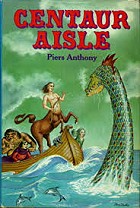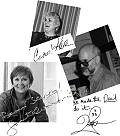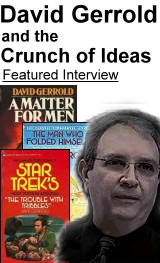Summer 2014-5
(Dec - Feb)
Writings High and Low
by Tim Waggoner
In 1982, my mother was scheduled for surgery. The night before, my dad and I stopped at a small local bookstore (remember those?), and I discovered that Piers Anthony had released Centaur Aisle, the fourth book in his Xanth series.

In my family, the rule was whoever bought a book or comic got to read it first, but when Dad saw that I'd picked up Centaur Aisle, he very quietly asked if I wouldn't mind if he read it first. I didn't understand initially, but then I realized he wanted to have something to distract him while Mom was in surgery. I of course said yes.
I learned something very important that day. Regardless of how "high" or "low" a given work of art is viewed by critics, they all have their power and should be honored for that. In this particular instance Centaur Aisle had the power to calm (at least a bit) the mind of a man whose wife was undergoing surgery. A more challenging and "artistic" work of literature couldn't have done that, not in that situation, not for him, and not on that day.
So sometimes I write stories and books that I intend to be pure entertainment, sometimes I write tie-ins, sometimes I write fiction that I have higher artistic aspirations for, and sometimes I write stuff that combines both entertainment and (I hope) art. Regardless of what I write or why I write it, I always remember that each work has its own power, and that makes it worth writing and sharing with people.
by Tim Waggoner
12 October, 2014
Reprinted by permission.
Tim Waggoner on Facebook
See also: Tim Waggoner answers The Usual Questions
This issue in Festivale
Dystopian Literature: Science Fiction That Borders on Horror
Leigh M. Lane writes: "Of the numerous subgenres of science fiction, dystopian literature is arguably among the most misunderstood. While most speculative works hit close to home in one way or another, the dystopia does so in a way that can be especially unsettling."
New series in the Series Series
The Usual Questions Project
More authors have answered The Usual Questions, our quirky, Q and A sessions.
Anyone who is a professional can be part of the project: authors, illustrators, film-makers, performers. The Usual Questions index page has a list of the authors and film-makers and illustrators participating in the project.
People who have answered the questions in the past include Terry Pratchett, Lawrence Block, Janet Evanovich, Charlaine Harris, Tanya Huff, Harlan Ellison.
This issue, the following authors and editors and illustrators have responded:

For posts about Melbourne events, places, news, reviews, giveaways, see our Facebook Page:





 Published in Melbourne, Victoria, Australia
Published in Melbourne, Victoria, Australia